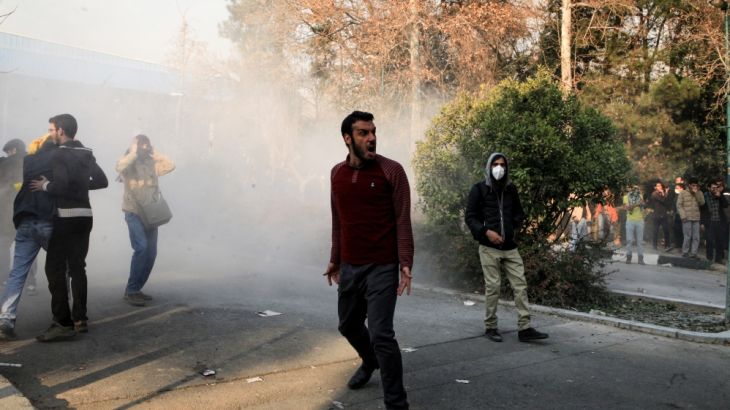Rouhani defends right to protest but rejects violence
In first remarks since rallies began, Iran’s president says criticism must be expressed peacefully, hits back at Trump.

Iran’s President Hassan Rouhani says people in the country have the right to protest but warned that violence is unacceptable.
His comments on Sunday were the first since widespread anti-government protests, the biggest show of dissent since huge rallies in 2009, broke out in the Islamic Republic earlier this week.
Keep reading
list of 4 itemsWho will be Iran’s next president? | Start Here
Oil slumps two percent on possible return of Iranian supply
Border security a common concern for Pakistan and Iran: Rouhani
“It should be clear to everyone that we are people of freedom. According to the constitution and citizens’ rights, people are free to express their criticism and to protest,” Rouhani said in televised comments from Iran’s capital, Tehran.
“However, we need to pay attention to the manner of that criticism and protest. It should be in such a way that it will lead to the improvement of the people and state,” he added.
“People have the right to protest, but those demonstrations should not make the public feel concerned about their lives and security.”
Social media apps blocked
Iranians began protesting on Thursday in the second-largest city of Mashhad, rallying against the clerical elite, which they blame for economic hardships and alleged corruption.
The rallies have since gained momentum and spread to other cities, including Tehran, where clashes between students and police were reported on Saturday.
On Sunday, Mehr, the semi-official Iranian news agency, reported that at least two protesters died on Saturday night in Dorud, a city in western Iran, although there is confusion over who is responsible for the deaths.
Habibollah Khojastepour, security deputy of the governor of Lorestan province, said the presence of “agitators” prevented a peaceful end to the protest, according to Mehr.
Khojastepour said neither police nor security forces fired at the protesters. He did not provide a reason for their deaths.
News of the fatalities came as Interior Minister Abdolrahman Rahmani Fazli warned demonstrators against disruptive behaviour.
“Those who abuse the police’s self-restraint and composure shall be responsible to the people for the disruption and disorder,” he said in a televised statement.
“Nothing will be solved by disruption and lawlessness. For us, it is well known who created this situation, provoking turmoil and promoting violence in cyberspace.”
Earlier on Sunday, Iran restricted access to some social media apps – including the messaging service Telegram, which has 40 million users – as the government tries to stop details being spread about any upcoming protests.
Rouhani hits back at Trump
Potkin Azarmehr, a blogger who focuses on the secular pro-democracy struggle in Iran, told Al Jazeera that several groups have been protesting for some time “and now their slogans have become more radical.
“They no longer seem to have that fear from security forces,” he said.
Mahan Abedin, an Iran analyst at Middle East Eye, said the protests reflect the gap between ordinary Iranians and the political elite.
The protests appeared to be “articulated by people who ostensibly have purely economic motives”, he said.
“I think in keeping with long-standing culture, inevitably these protests have become political.
“[President Hassan] Rouhani has the right attitude but his government riles people. This is a very elitist government, they are bureaucratic elites, technocratic elites – they are very distant from grievances of ordinary people.”
Meanwhile, the US has been quick to respond to developments, with President Donald Trump posting a series of tweets on Iran.
“Oppressive regimes cannot endure forever. The world is watching!” he wrote in one of them.
Rouhani hit back at Trump on Sunday, saying the US president “has forgotten that he had called Iranian people ‘terrorists’ a few months ago.”
Under Trump’s administration, the two countries have grown further apart, clashing on foreign policy issues such as the wars in Syria and Yemen and over the 2015 nuclear deal with world powers.